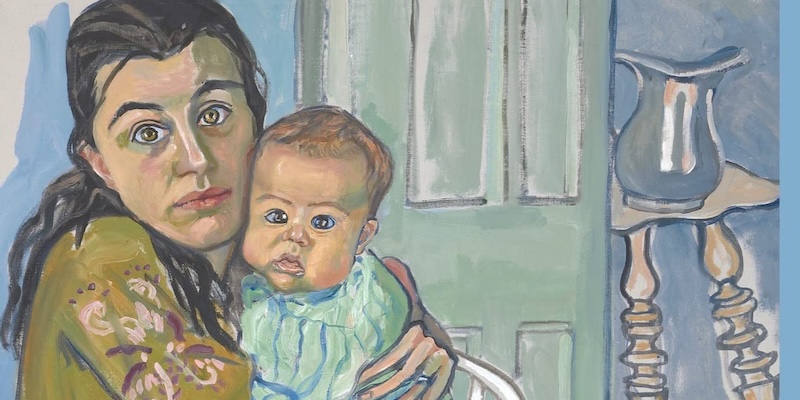
Babies, Wanted and Unwanted: Five Books That Explore Motherhood, Intention, and Desire
Uttama Kirit Patel Recommends Constance Debré, Julie Phillips, Anna Hogeland, and More
I have always wanted to be a mother (just not solely a biological one). The presumption that women want to be mothers, or want to mother in a specific way, ruthlessly overlooks the nuance of maternal desire.
In my novel, Shape of an Apostrophe, Lina never wanted to have children but falls unexpectedly pregnant. The seemingly progressive families of the Indian diaspora are derailed by Lina’s maternal ambivalence. The story is set in Dubai, a place with limited reproductive rights and ample luxury, a contentious backdrop for where she is trapped by the narrow confines of convention.
Despite being the higher income-earner, an Ivy-League graduate, and an artist—all qualities falsely praised pre-pregnancy—Lina is held to different standards in matters of domestic life. As she tries to defy the default pattern of compliance expected of her, and the permission to shirk responsibility bestowed upon her husband, the role of mother further loses appeal.
I created Lina’s character as a challenge to my own traditional choice, and my novel is an investigation of intentional parenthood, and the danger of remaining imprisoned in unwanted familial roles.
Below are books which expose the complexity of choosing, upholding or opting out of motherhood.
*

Constance Debré, Love Me Tender
Told in a deadpan voice, this is a novel about a woman who loses custody of her young son, her queerness used against her. Instead of expected self-pity, she moves through her new life with a calm, relentless authority to be as she wants, and dare I say, find pleasure in it.
“I was going to do it my way, without the absurdity that comes with being a woman, the obscenity that comes with being a mother.”
Brutally honest, this is a character who not only shatters external conventions, but refuses to let gendered standards infiltrate her inner space. “Mother as a status, an identity, a form of power, a lack of power…victim and persecutor, it doesn’t exist.”

Julie Phillips, The Baby on the Fire Escape: Creativity, Motherhood, and the Mind-Baby Problem
This book is an exploration of opposing forces: a child that needs commitment and a calling that requires freedom. Raising children in a polyamorous union, writing in a constant state of interruption, surrendering the identity of mother so as to rise to artistic greatness—these are some ways the “ostensibly liberated” creatives examined in this book (including Ursula K. Le Guin, Audre Lorde, and Susan Sontag) made space for the imagination and the domestic.
A battle of the spirit as much as of logistics, we are shown the depths of what creativity and motherhood simultaneously demanded of the women, a struggle intensified from feeling thwarted by both.

Anna Hogeland, The Long Answer
Does fertility upend friendships? At the centre of this novel is the relationship between two sisters (one pregnant, and one who has recently miscarried), who tell each other stories of other women to illuminate their own. The narrative gracefully shows how maternal ache can make us envy loved ones, how a stranger’s horrific pregnancy can derail one’s own, and the intimate, yet biting ways women speak to each other about their bodies.
Hogeland manages to encompass many realities—stillbirth, egg donation, abortion, IVF—and reveal the impact of other women’s judgements on maternal decision-making.

Elena Ferrante, The Lost Daughter
“I’m an unnatural mother,” says Leda, a middle-aged divorcée who is “miraculously unfettered” and free of her teenage daughters after many years. Through her obsession with a family holidaying at the same beach Leda has escaped to, she uncovers relief and regret over the decisions she made as a young mother, including a period of time she left her children to advance her career.
By examining Leda’s relationship with her own mother, the stifling realities of childcare, and generational patterns of loss, Ferrante excavates the push and pull of abandonment, and offers the uncomfortable idea that broken bonds might never be mended.

Helen Phillips, The Need
This novel—not unlike the realities of a maternal existence—surprises, terrifies and disorients. It is a speculative thriller in which the character’s sense of reality is questioned as she protects her children from an intruder in the house.
Refreshing are the dark and bordering-on-cruel details: “Her desperation for her children’s silence manifested as a suffocating force, the desire for a pillow, a pair of thick socks, anything she could shove into them.” Phillips downplays no part of the all-consuming demands of parenting: “every single thing in life shoved between the needs of a pair of people who weighed a cumulative fifty-seven pounds.”
This is a mother brought to near madness whose intentions we question even as she fights to keep her children safe.
______________________________

Shape of an Apostrophe by Uttama Kirit Patel is available via Serpent’s Tail.
Uttama Kirit Patel
Uttama Kirit Patel is a writer and magazine founder and editor, and has lived in twelve cities across three continents. She holds an MPhil in Psychology from the University of Cambridge, has been a semi-finalist in the Raymond Carver Short Story Contest, and was nominated for the PEN/Robert J. Dau Short Story Prize for Emerging Writers. She is the author of Shape of an Apostrophe. https://uttamapatel.com/



















